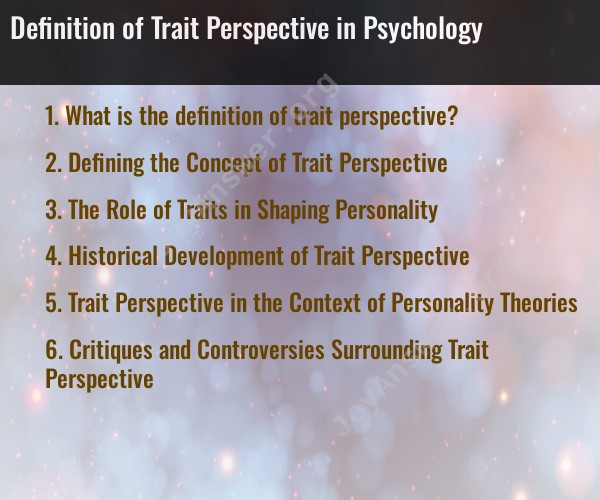What is the definition of trait perspective?
The trait perspective in psychology is an approach to understanding human personality that focuses on identifying and describing the stable, enduring characteristics or traits that make individuals unique. Traits are relatively consistent patterns of thoughts, feelings, and behaviors that distinguish one person from another. Trait theory seeks to categorize and measure these personality traits to better understand and predict how individuals will behave in various situations.
Key points related to the trait perspective in psychology include:
Trait Description: Trait theorists aim to describe and categorize personality traits using specific adjectives or descriptors. These traits might include characteristics like "outgoing," "conscientious," "introverted," "emotional," "agreeable," and "open to experience."
Consistency and Stability: Trait theory assumes that personality traits are relatively stable and consistent over time and across different situations. While individuals may exhibit some variability in their behavior, traits represent the enduring qualities that persist over time.
Trait Dimensions: Traits can be organized into dimensions or factors, which capture related traits. The most well-known model is the Five Factor Model (Big Five), which includes five major dimensions: Openness, Conscientiousness, Extraversion, Agreeableness, and Neuroticism (OCEAN).
Measurement and Assessment: Psychologists use various methods to assess and measure personality traits. These methods include self-report questionnaires, interviews, and observational techniques. The goal is to quantify and compare individuals' traits.
Applications: The trait perspective has applications in fields such as psychology, sociology, and organizational behavior. It's used to better understand individual differences and predict behavior in various contexts, including relationships, work, and social interactions.
Limitations: While trait theory offers a valuable framework for understanding personality, it has been criticized for oversimplifying the complexity of human personality and for not fully accounting for situational influences on behavior. It doesn't address the role of social and environmental factors as strongly as some other personality theories.
The trait perspective is one of several approaches to studying personality and understanding what makes individuals unique. It complements other perspectives, such as psychodynamic, humanistic, and social-cognitive approaches, providing a valuable tool for categorizing and describing personality traits and their influence on behavior and personal characteristics.
Defining the Concept of Trait Perspective
Trait perspective, also known as dispositional theory, is a prominent approach in personality psychology that focuses on identifying and measuring relatively stable personality traits that influence an individual's thoughts, feelings, and behaviors. It suggests that people possess various traits, such as extroversion, agreeableness, and neuroticism, which can be used to describe their overall personality structure.
Key Principles of Trait Perspective:
Individual Differences: Each individual possesses a unique combination of traits that contribute to their personality.
Trait Stability: Traits are relatively stable over time and tend to persist across different situations.
Trait Influence: Traits influence an individual's behavior, choices, and interactions with the world.
The Role of Traits in Shaping Personality
Traits are considered fundamental building blocks of personality, influencing how individuals perceive, interpret, and respond to their environment. They contribute to individual differences in various aspects of life, including:
Social Behavior: Traits like extroversion and agreeableness influence an individual's social interactions, communication styles, and ability to form and maintain relationships.
Emotional Regulation: Traits like neuroticism and emotional stability play a role in an individual's ability to manage emotions, cope with stress, and maintain emotional balance.
Motivation and Achievement: Traits like conscientiousness and achievement motivation influence an individual's goals, work ethic, and persistence in pursuing objectives.
Decision-making and Risk-taking: Traits like openness to experience and risk aversion influence an individual's willingness to explore new ideas, take risks, and adapt to change.
Historical Development of Trait Perspective
Trait perspective has evolved over time, with significant contributions from various psychologists and researchers:
Gordon Allport: Allport identified thousands of personality traits and categorized them into three levels: cardinal, central, and secondary.
Hans Eysenck: Eysenck's Eysenck Personality Questionnaire (EPQ) proposed three fundamental personality dimensions: extroversion-introversion, neuroticism-stability, and psychoticism.
Raymond Cattell: Cattell reduced Allport's list of traits to sixteen primary factors using factor analysis, forming the basis of the Sixteen Personality Factor Questionnaire (16PF).
Lewis Goldberg: Goldberg's Five-Factor Model (FFM) or the Big Five personality traits – extraversion, agreeableness, conscientiousness, neuroticism, and openness to experience – is the most widely accepted and researched trait model today.
Trait Perspective in the Context of Personality Theories
Trait perspective is one of several approaches to understanding personality, each offering unique insights and perspectives:
Psychodynamic Theories: Focus on unconscious conflicts, drives, and defense mechanisms in shaping personality.
Humanistic Theories: Emphasize the importance of self-actualization, personal growth, and subjective experiences in personality development.
Social Cognitive Theories: Highlight the role of social learning, observation, and reinforcement in shaping personality traits and behaviors.
Biological Theories: Explore the influence of genetics, neurobiology, and hormonal factors on personality traits and individual differences.
Trait perspective complements these other approaches by providing a systematic framework for identifying, measuring, and understanding the stability and influence of personality traits.
Critiques and Controversies Surrounding Trait Perspective
Trait perspective has been criticized for its focus on describing traits rather than explaining their underlying causes or mechanisms:
Trait Stability: The assumption of trait stability has been challenged by research suggesting that traits can change over time and in response to significant life events.
Cultural Sensitivity: Trait theory has been criticized for its potential Western bias, as trait definitions and assessments may not fully capture the nuances of personality across diverse cultures.
Individual Complexity: Trait theory may oversimplify the complexity of human personality by focusing on a limited number of traits, potentially overlooking individual differences and unique personality patterns.
Despite these criticisms, trait perspective remains a valuable framework for understanding and predicting personality, and ongoing research continues to refine and expand our knowledge of personality traits and their implications.











